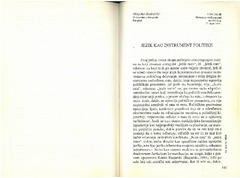Jezik kao instrument politike
Апстракт
In the opening sections of the paper the author explains how she understands the syntagms the language of peace and the language of war. The basic thesis which is elaborated throughout the text is that languages, as systems of signs with a primary social communicative function, cannot in themselves be either warmongering or peace-making. War and peace are political goals which the language may to serve. This thesis is tested on examples of several messages most often exploited during the civil war in Yugoslavia.
In addition, the author points to the dominant stereotypes in the war propaganda in the media, those referring to Ustashas, Chetniks or Mujaheddins. The road toward the language of peace will be paved when the top decision makers decide to stop the war. For language does not direct plitical processes; it simply turns out to be the most suitable medium for sending, or transferring the political message - the message that those in the position to decide have opted for either war... or peace as the means of solving political conflicts.
Кључне речи:
language / politics / civil war in Yugoslavia / sociolinguisticsИзвор:
Ka jeziku mira (ed. B. Jakšić), 1996, 181-191Издавач:
- Beograd: Forum za etničke odnose
Финансирање / пројекти:
- Истраживање климатских промена и њиховог утицаја на животну средину - праћење утицаја, адаптација и ублажавање (RS-MESTD-Integrated and Interdisciplinary Research (IIR or III)-43007)
Колекције
Институција/група
IFDTTY - CHAP AU - Radojičić, Mirjana PY - 1996 UR - http://rifdt.instifdt.bg.ac.rs/123456789/1790 AB - In the opening sections of the paper the author explains how she understands the syntagms the language of peace and the language of war. The basic thesis which is elaborated throughout the text is that languages, as systems of signs with a primary social communicative function, cannot in themselves be either warmongering or peace-making. War and peace are political goals which the language may to serve. This thesis is tested on examples of several messages most often exploited during the civil war in Yugoslavia. In addition, the author points to the dominant stereotypes in the war propaganda in the media, those referring to Ustashas, Chetniks or Mujaheddins. The road toward the language of peace will be paved when the top decision makers decide to stop the war. For language does not direct plitical processes; it simply turns out to be the most suitable medium for sending, or transferring the political message - the message that those in the position to decide have opted for either war or peace as the means of solving political conflicts. PB - Beograd: Forum za etničke odnose T2 - Ka jeziku mira (ed. B. Jakšić) T1 - Jezik kao instrument politike SP - 181 EP - 191 UR - https://hdl.handle.net/21.15107/rcub_rifdt_1790 ER -
@inbook{
author = "Radojičić, Mirjana",
year = "1996",
abstract = "In the opening sections of the paper the author explains how she understands the syntagms the language of peace and the language of war. The basic thesis which is elaborated throughout the text is that languages, as systems of signs with a primary social communicative function, cannot in themselves be either warmongering or peace-making. War and peace are political goals which the language may to serve. This thesis is tested on examples of several messages most often exploited during the civil war in Yugoslavia.
In addition, the author points to the dominant stereotypes in the war propaganda in the media, those referring to Ustashas, Chetniks or Mujaheddins. The road toward the language of peace will be paved when the top decision makers decide to stop the war. For language does not direct plitical processes; it simply turns out to be the most suitable medium for sending, or transferring the political message - the message that those in the position to decide have opted for either war or peace as the means of solving political conflicts.",
publisher = "Beograd: Forum za etničke odnose",
journal = "Ka jeziku mira (ed. B. Jakšić)",
booktitle = "Jezik kao instrument politike",
pages = "181-191",
url = "https://hdl.handle.net/21.15107/rcub_rifdt_1790"
}
Radojičić, M.. (1996). Jezik kao instrument politike. in Ka jeziku mira (ed. B. Jakšić) Beograd: Forum za etničke odnose., 181-191. https://hdl.handle.net/21.15107/rcub_rifdt_1790
Radojičić M. Jezik kao instrument politike. in Ka jeziku mira (ed. B. Jakšić). 1996;:181-191. https://hdl.handle.net/21.15107/rcub_rifdt_1790 .
Radojičić, Mirjana, "Jezik kao instrument politike" in Ka jeziku mira (ed. B. Jakšić) (1996):181-191, https://hdl.handle.net/21.15107/rcub_rifdt_1790 .


 ,
,